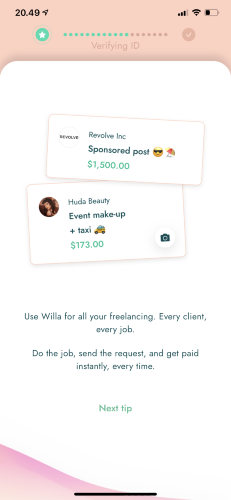Sommestad and Stefan Pettersson founded Willa Inc., a financial technology company that helps freelancers get paid on time for their work.
“We realized something is severely broken with the way things are for freelancers and creators, so we figured, let’s go out and solve the biggest problems for creators, which often come from the financial perspective,” Sommestad said.
The Venice-based company was founded in 2019 to replace the traditional invoicing process. The Willa app pays freelancers immediately and gives their clients the option to pay over 30, 60 or 90 days, with Willa taking a 2.9% fee per transaction.
The company launched an invite-only beta version of its platform in September and began rolling out the Willa iOS app to its waitlist of 150,000 freelancers in July.
“In the U.S., there’s almost 60 million freelancers. Globally, there are hundreds of millions of freelancers,” Sommestad said. “We want to help all of them.”
On July 7, the company announced it had raised $18 million in a Series A funding round, bringing its total to $21 million. Its backers include New York-based FinTech Collective Inc., London-based Entrée Capital and Stockholm-based EQT Ventures.
Sommestad said Willa plans to use the funding to expand the app to its waitlist and ramp up hiring. The company has hired nearly 20 people since the end of July.
When starting the company, the Willa executive team, which is composed of startup and tech industry veterans, was well prepared to take on challenges such as fundraising and product design.
But remote work due to the pandemic presented a unique problem: Half of the company was based in Europe while the other half was in the United States, and travel restrictions meant they could no longer meet in person.
Willa was able to settle into remote work relatively quickly, Sommestad said.
“We have a fantastic team, but most of them I’ve never met before,” Sommestad said. “That’s exciting, and a bit challenging, but I think more than anything it’s the way to build a business today.”
With many turning to freelance work after losing full-time positions, the freelance economy also exploded amid the pandemic, contributing $1.2 trillion to the U.S. economy last year, according to Upwork Inc. This growth gave Willa a boost that has helped it thrive.
“The freelancing lifestyle is getting more attention,” Sommestad said. “Longer term, the pandemic is going to accelerate the freelance movement even more.”

